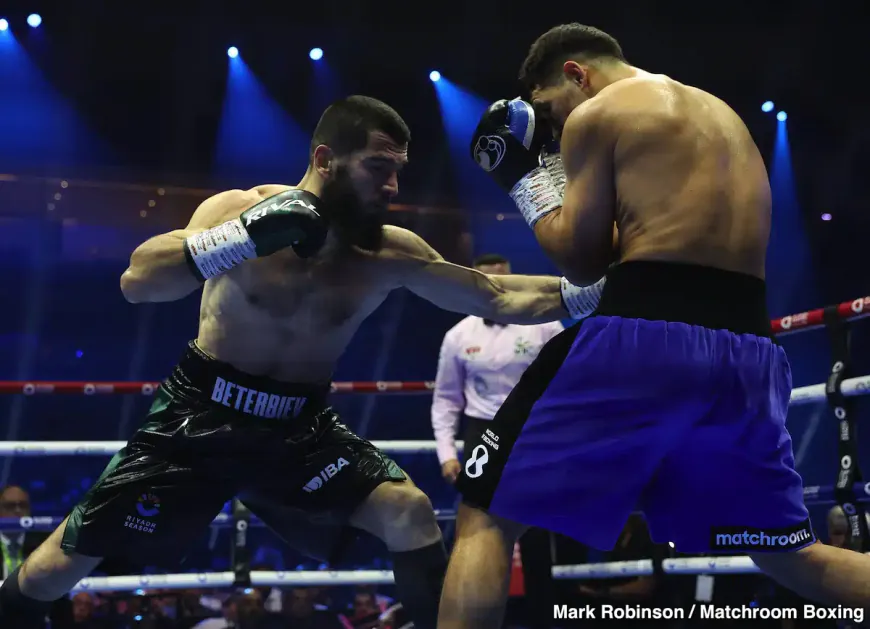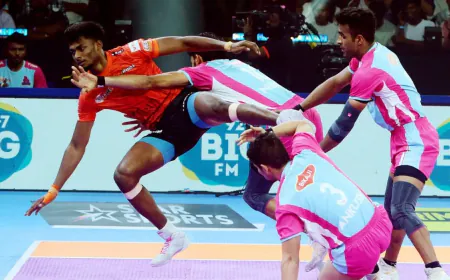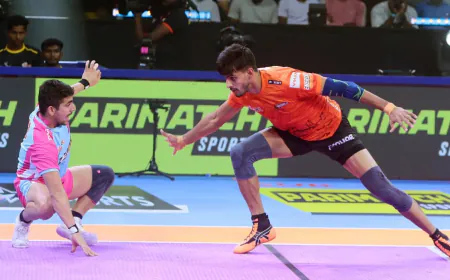Shawn Porter: Bivol’s Movement Dominated Beterbiev, But Not Enough for Victory
Close Rounds and the Final Decision The final few rounds were especially critical. Porter and other analysts highlighted rounds 8, 10, and 11 as moments when Bivol looked vulnerable and close to being knocked out. Beterbiev’s pressure intensified during these rounds, forcing Bivol to move even more and throw fewer punches. In the twelfth round, Bivol was almost entirely focused on survival, moving around the ring without attempting to engage Beterbiev.

On October 12, 2024, in Riyadh, Saudi Arabia, Dmitry Bivol faced Artur Beterbiev for the undisputed light heavyweight championship. The match, highly anticipated by boxing fans worldwide, saw Bivol's strategic movement against Beterbiev's power punches. According to Shawn Porter, Bivol won the fight 8-4 in rounds, but his tactics of avoiding engagement and fighting in spurts led to a close and controversial decision, with the judges scoring it 114-114, 115-113, and 116-112 in favor of Beterbiev.
Porter, a former world champion and boxing analyst, believed that Bivol's use of movement was effective in neutralizing Beterbiev's offense. Throughout the match, Bivol was able to land quick shoeshine punches and avoid getting trapped by Beterbiev’s heavy shots. However, despite Bivol’s tactical approach, Porter admitted that Beterbiev’s sheer power and pressure played a significant role in swaying the judges.
Bivol’s Strategy: Movement and Defense
Porter emphasized how Bivol’s movement prevented Beterbiev from landing many clean shots. Throughout the fight, Bivol utilized his footwork to dodge and weave, making it difficult for Beterbiev to connect with his trademark power punches. Bivol would often land combinations before quickly retreating, effectively "taking away" Beterbiev’s opportunities to capitalize on his offensive moments. According to Porter, this was enough for Bivol to claim the majority of the rounds, especially in the first half of the fight.
In the second half, however, the dynamic began to shift. Beterbiev, despite being slower than Bivol, began to catch up and land more effective punches. His powerful shots, even when blocked by Bivol's gloves, seemed to affect Bivol's rhythm. Porter noted that after Beterbiev connected, Bivol would often retreat, appearing shaken by the force behind the punches, even if they didn’t land flush.
Survival Mode: Bivol’s Cautious Approach
One of the key points Porter raised was Bivol’s decision to fight more cautiously as the match progressed. Rather than standing toe-to-toe with Beterbiev, Bivol spent much of the fight’s second half in what Porter described as "survival mode." By constantly moving around the ring, Bivol ensured that he wouldn’t get knocked out. This strategy, while keeping him safe, also meant that Bivol wasn’t throwing enough punches to convincingly win rounds. According to Porter, this was a self-defeating tactic.
Bivol’s reluctance to engage fully allowed Beterbiev to maintain the pressure, and it was clear to the judges that Beterbiev was the aggressor throughout the fight. Despite Bivol’s superior technique and ability to control the pace at times, his lack of offensive output in key moments cost him.
Beterbiev’s Power: The Game-Changer
While Bivol may have been the more technical fighter, Beterbiev’s power was the decisive factor in the eyes of the judges. Even when Bivol blocked or avoided Beterbiev’s punches, the force behind them was enough to make Bivol retreat and reset. Porter mentioned how Bivol would sometimes go on the defensive for an entire minute after getting hit, showing the effect that Beterbiev’s punches had, even if they didn’t always connect cleanly.
Lionell Thompson, another boxing commentator, echoed this sentiment, explaining that Beterbiev’s punches looked more damaging than Bivol’s, which may have influenced the judges. Thompson also noted that while Bivol was landing flashy combinations, many of his punches were hitting Beterbiev’s gloves, reducing their impact. In contrast, when Beterbiev landed his punches, even on Bivol’s gloves, it had a noticeable effect, as Bivol would immediately retreat.
Close Rounds and the Final Decision
The final few rounds were especially critical. Porter and other analysts highlighted rounds 8, 10, and 11 as moments when Bivol looked vulnerable and close to being knocked out. Beterbiev’s pressure intensified during these rounds, forcing Bivol to move even more and throw fewer punches. In the twelfth round, Bivol was almost entirely focused on survival, moving around the ring without attempting to engage Beterbiev.
Porter acknowledged that Bivol’s movement allowed him to avoid getting knocked out, which was a victory in itself. However, by not engaging more in the later rounds, Bivol essentially handed the fight to Beterbiev, as the judges saw Beterbiev as the more aggressive and damaging fighter throughout the bout.
The Case for a Rematch
Despite the loss, Porter believes that Bivol’s performance leaves the door open for a rematch. Had Bivol stood and fought more aggressively, he risked getting knocked out, which would have ended his chances of a rematch. By going the distance, Bivol not only preserved his chances for another fight but also gave his promoter and team the opportunity to argue that the decision was close enough to warrant a second bout.
Porter noted that Bivol’s team could use the narrative that their fighter deserved to win, even if they didn’t fully believe it. The fact that the judges’ scorecards were relatively close indicates that a rematch could be a lucrative and highly anticipated event. Both fighters still have something to prove, and with a rematch, Bivol will have the chance to adjust his strategy and perhaps take a more aggressive approach.
In the end, Porter had Bivol winning 8-4 in rounds, but he understood why the judges favored Beterbiev. Bivol’s cautious approach, while effective in preventing a knockout, ultimately cost him on the scorecards. Beterbiev’s power and aggression were enough to sway the judges, even though Bivol had his moments of control. A rematch seems likely, and if it happens, both fighters will need to adjust their strategies to secure a definitive victory.



















































